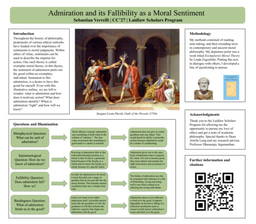Project Outline: Goodness in Exemplar Moral Theories

Goodness in Exemplar Moral Theories
Supervised by: Prof. Dhananjay Jagannathan, Assistant Professor of Philosophy; Director of Graduate Studies, Classical Studies Program
Project Background
My research is in the field of ethics. The concerns of ethics are two-fold. Firstly, the discipline aims to establish what qualifies a good life. Secondly, it examines how agents may achieve that good life. In other words, what kinds of practices, principles, or qualities should one seek out so that one can lead a life that is worth living? Given that this question is incredibly broad, I will focus on discussions of virtue ethics, especially those influenced by Aristotle. Virtue ethics are agent-based frameworks that emphasize the qualities and actions that people should take so that they can lead valuable lives. This differs from the two other major ethical fields of consequentialism and deontology, for they utilize abstracted principles to convey the general obligations of individual agents. I will be taking a deeper look into literature that discusses exemplary conduct and exemplary individuals to examine the qualities that guide people towards the recognition and emulation of the exemplars.
Research Questions
How is goodness identified? What informs individual conceptions of goodness? How does one emulate the actions of an exemplar?
Objectives
My plan is to gather a sufficient background of information so that I may write a philosophical paper regarding the nature of goodness and right action in exemplar moral theories.
Methodology
I will be performing a detailed review of literature in the field of exemplar moral theory and virtue ethics. This will involve reading papers and books and taking detailed notes.

Please sign in
If you are a registered user on Laidlaw Scholars Network, please sign in